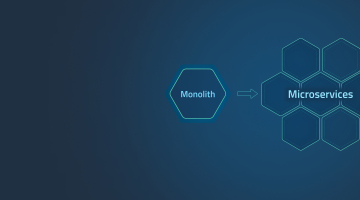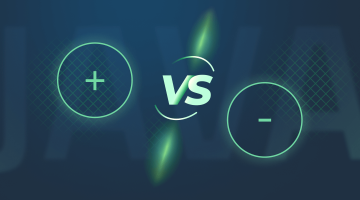

Java vs RoR for enterprise applications: Which to choose?
Actually, a programming language isn’t like a pair of jeans that fit everything. Even if you have a clear goal in mind to create enterprise applications, there are too many details that will influence your choice in the stand of Java vs Ruby on Rails.
Moreover, enterprise applications software (EAS) is difficult with an insane amount of information. But the results are well worth the effort. In 2015, the financial and banking services market generated $23.75 billion in revenue worldwide from enterprise applications.
Ruby on Rails (RoR)

Ruby on Rails is an elegant and compact way to create web apps really quickly. This is a beginner-friendly programming language with simple syntax.
Ruby is one of the top 10 programming languages. GitHub, Hulu, and Airbnb actively use Ruby on Rails. In 2015, there were approximately 1.78 million downloads of Rails 5 and more than 2 million of Rails 4.2.7.
What is Ruby on Rails used for? RoR is a common framework because it offers many choices for programmers when they create administration interfaces for their enterprise apps. Thus, creating simple model relations and elementary blog-like websites is usually where Ruby on Rails is used.
When it comes to Ruby vs Java, though, there are certain similarities between the two.
- They have the same object-oriented principles.
- Memory is controlled by a garbage collector.
- Objects are strongly typified.
- There are protected public and private methods.
- There are embedded doc instruments.
Now, let’s consider the pros and cons of Ruby on Rails and Java.
Pros of Ruby on Rails enterprise application development
- Intuitive and simple code.
- Ruby on Rails refines and gets quicker. It keeps updating and developing. New improvements make the language cleaner, faster, and safer.
- This is a perfect fit for startups because it has opportunities to speed up the process and match the limited budget. Moreover, RoR is a free, open-source framework.
- Various gems allow programmers to fulfill rich functionality in apps.
- It saves time: on average, programmers create apps 30-40% quicker by using RoR.
- Ruby is quick to handle the vast majority of web applications.
- This is a multilateral tool.
- It has a strong community of web developers.
- It is close to English and applies an internal DSL with its own semantics. That’s why users don’t need to apply an external parser.
Cons of Ruby on Rails enterprise application development
- The ecosystem is limited outside of web development. When Ruby developer searches to generate, host, and manipulate or secure a platform, you may do that but without the depth.
- It lacks opportunities for high-performance math, UI development, and embedded footprint environments.
- Meta-programming brings confusion for new programmers. The ability for libraries to augment and open classes confuses new developers. For example, if two modules will retrofit the same function on the same class, it will cause a number of issues.
What companies use Ruby on Rails
Which companies use Ruby on Rails? Ruby on Rails pros and cons better-fit startups and helps beginners to start coding. It has helpful features to debug, programmers may skip a few codes. Companies using Ruby on Rails acquire the power to create needed functionality in enterprise applications. If taking into account Java, it wins with its high popularity, and ability to migrate to any other app, database, or platform. This is a language well-prepared for machine learning and data science.
Java

Java is a computing platform for enterprise applications and one of the most popular programming languages. It is reliable, secure, and fast.
Enterprise applications promote various business processes involving resource planning, operations management, and data. A great enterprise app needs to be secure, portable, and scalable. Java has many libraries and tools, and ODEs allow programmers to easily implement and design any feature. That’s one of the reasons why 90% of Fortune 500 companies apply this language. More than 3 million devices use Java, according to Oracle.
You might be interested in reading our article “How to Build Enterprise Software: Ultimate Guide”
Pros of Java
Let’s consider the main advantages of Java for EAS.
- Integrated development environments for Java may bring meaningful feedback on errors and more details where they appear without running the code. It speeds up debugging and allows learning from mistakes.
- Moreover, Integrated development environments have “autocomplete” abilities to faster learn programming libraries.
- It provides flexibility and has a massive number of libraries and APIs.
- Useful programming standards.
- Standardized coding styles in Java allow to speed up the processes with existing patterns. And it’s simpler to follow others’ example code and meet a quality standard.
- 86% of all smartphones are powered by Android, and Java fits Android, leads the enterprise app market, and drives the Tiobe chart.
- Actually, it is the heart of the Android operating system. Platform independence allows merging business apps with desktop software. Moreover, with Java, you can easily migrate to any database or platform.
- It is a great choice for forward-thinking businessmen. This is the second common language for data science and machine learning. These are very promising areas as the global cognitive computing market will be $12 billion in the next few years.
- Managed memory.
- This is a free and mature language.
- Native threads.
- Secure features to protect systems.
- Web developers think that coding in Java is simple and comfortable. It doesn’t demand pointers and eased operations with agile coding structures.
- It has a stack provision system that saves data and statistics that may be rebuilt quickly. The operation of garbage collection allows for providing automatic garbage collection.
- It has needed networking capabilities.
- Companies may reuse written Java codes for other apps.
- Advanced authentication helps to implement secure login mechanisms and develop a custom security policy to protect internal data.
- Java also supports Public Key Infrastructure that refines the application response time during validating and checking security certificate statuses.
Cons of Java
- Confusing misfeatures. For example, encapsulation has a complex control model. It leads to insecure classes and packages and makes programs public even if you don’t plan to widely open access. Another example is anonymous subclasses that are unreadable without knowing a special-case feature.
- Simple types such as booleans, integers, and characters must be managed as special cases.
- It lacks high-level features.
- Java develops very slowly and doesn’t have all modern features.
- This language is overkill for small applications.
What companies use Java
Java is used to develop such applications: enterprise applications, desktop GUI applications, web applications involving front and back-office electronic trading systems, e-commerce apps, etc., embedded systems, Android apps, scientific applications, and middleware products. It is the usual choice of established companies and enterprises of different scales rather than of startups and beginners.
Learn more about technologies:
Guide to interviewing: How to screen Java developer skills
Angular or React, which is better for your project development?
Ruby on Rails vs Java
There are many discussions around Ruby on Rails vs Java. Ultimately, one should make a final choice based on the set of fitting strengths they have over each other.
Advantages of Ruby on Rails over Java
- First of all, by using Ruby on Rails, you may achieve the goal with fewer lines of coding. It allows for improving bug fixing.
- RoR doesn’t need compilation, and code may be interpreted. When it comes to Rails vs Java in this aspect, Java code has to be compiled.
- RoR brings readability and flexibility.
- RoR allows the programmer to skip a few codes, while Java follows a strict C syntax.
- Ruby on Rails does not have type statements, and you may set a name to a variable as required. In Java, each member variable pertains to some class. Therefore, a web developer needs to declare the variable type before applying it in code.
- Ruby developers may try different third-party toolkits involving Ruby-GNOME2, GUI FXRuby, wxRuby, Qt, etc.
- Users have private variables.
- You may skip parentheses.
- There’s no casting and static type checking.
Benefits of Java over RoR
- If we consider Ruby vs Java performance, Java brings better application performance.
- Java code execution is quicker because of transformation into machine language, and the Java Virtual machine creates the code quicker.
- Java is a well-known language, and it’s easier to find a solution to your specific challenge.
Conclusion
To make the final choice in favor of one solution, explore the similarity and differences between Java and Ruby to decide which one will match your business needs. Go through the shortcomings of the languages as well to eliminate all errors. In certain cases, RoR and Java may be used together, and they supplement each other. However, perhaps, you need completely something else for your specific purposes, like Python or PHP.
Our team is always happy to consult you on the right technology stack for your project. To get consulted, simply send us a request specifying your project requirements. Our experts will reply to you asap.





